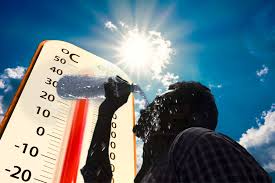How Excessive Heat Affects Mental and Physical Health
Introduction
Excessive heat is more than just uncomfortable weather; it is a serious public health issue that impacts both the body and the mind. With global temperatures on the rise, heat waves are becoming more frequent, more intense, and longer-lasting. While the physical dangers of heat such as dehydration and heat stroke are widely recognized, its impact on mental health is equally concerning. Understanding how excessive heat affects mental and physical health is essential to safeguarding communities in an increasingly warming world.
Physical Health Risks of Excessive Heat
When temperatures climb beyond the body’s ability to regulate itself, several health problems can arise.
Heat Exhaustion
This condition happens when the body loses too much fluid and salt through sweating. Symptoms include dizziness, nausea, fatigue, and heavy sweating. If untreated, heat exhaustion can escalate into heat stroke.
Heat Stroke
Heat stroke is a life-threatening emergency where the body temperature rises to dangerous levels. It can cause confusion, rapid pulse, unconsciousness, and even organ failure. Immediate medical attention is necessary to prevent death.
Dehydration
Excessive heat accelerates fluid loss through sweating. Dehydration not only affects physical performance but can also cause kidney strain, headaches, and reduced concentration.
Worsening of Chronic Conditions
High temperatures can put extra stress on the heart and lungs. People with cardiovascular disease, asthma, or diabetes often experience more severe symptoms during excessive heat events.
Mental Health Impacts of Excessive Heat
While physical effects are more visible, the toll of extreme heat on mental well-being is increasingly recognized by researchers.
Stress and Anxiety
Persistent exposure to high heat levels can cause irritability, restlessness, and increased stress. Individuals living in areas prone to frequent heat waves may develop long-term anxiety about safety and health.
Sleep Disturbances
Excessive heat makes it difficult to sleep, especially in homes without air conditioning. Poor sleep quality contributes to fatigue, depression, and reduced cognitive function.
Aggression and Violence
Studies have found a link between rising temperatures and increased aggression or violent behavior. This suggests that heat not only affects individual health but also impacts community safety.
Worsening of Existing Mental Illness
For individuals with pre-existing mental health conditions, extreme heat can worsen symptoms. Medications for depression, anxiety, or psychosis may also interfere with the body’s ability to regulate temperature, increasing health risks.
Strategies to Protect Mental and Physical Health
There are several ways to reduce the impact of excessive heat on overall well-being:
-
Stay hydrated by drinking water regularly throughout the day
-
Avoid strenuous outdoor activities during peak heat hours, typically from 10 a.m. to 4 p.m.
-
Use fans or air conditioning to maintain cooler indoor environments
-
Take cool showers or baths to regulate body temperature
-
Prioritize sleep by keeping bedrooms ventilated and using breathable fabrics
-
Seek mental health support if heat-related stress, anxiety, or sleep problems persist
-
Check on vulnerable individuals such as elderly neighbors, children, or those with chronic illnesses
Conclusion
Excessive heat is a growing global health threat that affects both the body and the mind. From dehydration and heat stroke to anxiety, poor sleep, and aggression, its effects are far-reaching and often underestimated. By recognizing these risks and adopting preventive measures, individuals and communities can better protect themselves. Staying informed is a critical part of staying safe. For the latest updates on health, wellness, and safety, yeemanews.com provides reliable resources to guide individuals through the challenges of extreme heat and beyond.

